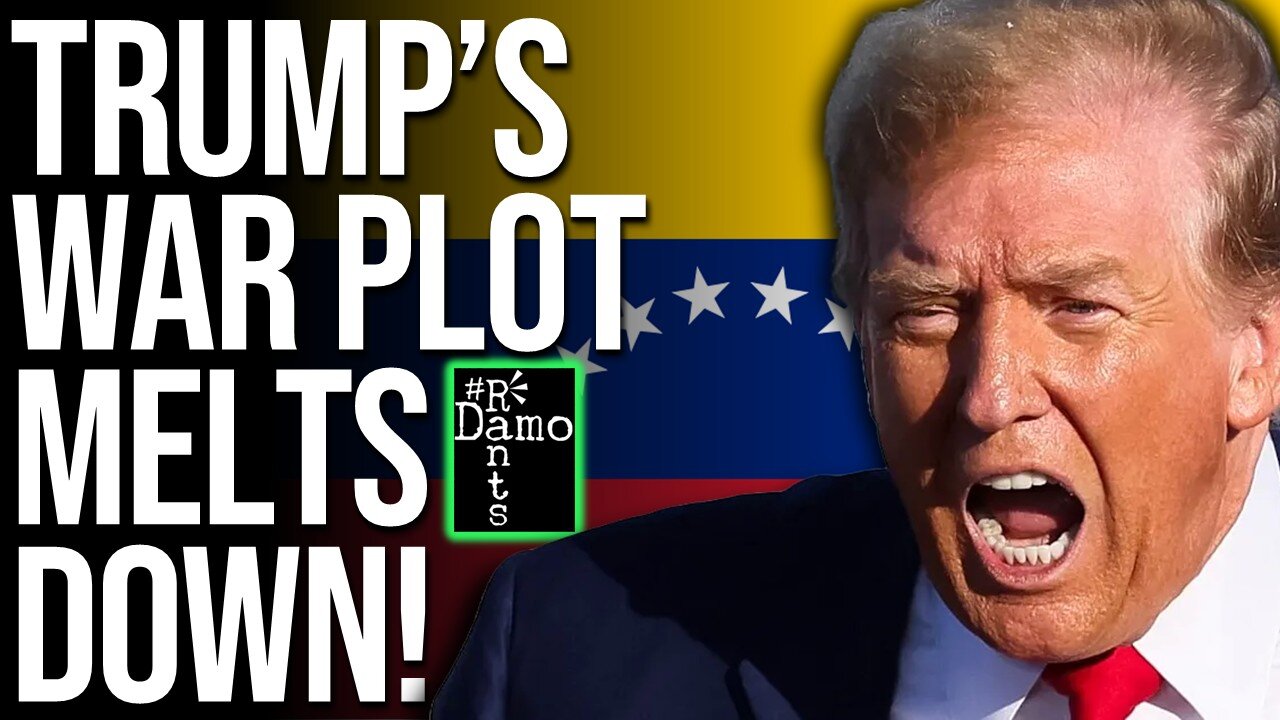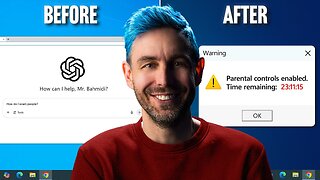Premium Only Content

Trump’s Covert War on Venezuela Just Backfired – And the Reason is Hilarious
Right, so here’s something almost poetic about watching an empire trip over its own propaganda. One day the tangerine tyrant Donald Trump is thumping the lectern, bragging that he’s unleashed the CIA on Venezuela to “stop the narco-terrorists.” The next, the head of the entire US Southern Command quietly walks out the door, leaving the mission without a commander and the White House without a fig leaf. This was supposed to be Washington’s new moral crusade — the war on drugs reborn in the Caribbean, with B-52 bombers flying overhead and playing the role of border police. Instead, it’s turned into a geopolitical farce: civilian deaths, an illegal covert war, and now open dissent inside the Pentagon over it. The mask has slipped. The “war on drugs” has become a war on credibility — Emperor Trump doesn’t have any, and its all blown up in his face hilariously when even the empire’s own generals don’t seem willing to fight it anymore.
Right, so in 15 October 2025, the sociopathic satsuma that passes himself off as President of the United States, Donald Trump, confirmed that he had authorised the Central Intelligence Agency, the CIA, to carry out covert operations inside Venezuela. He claimed the move was part of a new “war on narco-terrorism,” accusing the Venezuelan government of “emptying its prisons into the United States.” For anyone else, this would be an extraordinary admission — a sitting president acknowledging an illegal intelligence operation on the territory of another sovereign state, but with Trump, nothing ever seems to surprise us anymore does it?
The statement detonated across diplomatic circles though. Under Article 2(4) of the United Nations Charter, states are prohibited from using force or coercion against the territorial integrity or political independence of another nation, but what are the chances of any enforcement? Nevertheless, within hours, Venezuela’s foreign ministry denounced Trump’s comments as a “flagrant breach of international law” which of course they are, and lodged a formal complaint with the UN Security Council. The complaint cited both Article 2(4) and Article 51, arguing that the United States had committed a violation of sovereignty under the cover of narcotics enforcement. Upon meeting the Security Council…voiced concern. Yeah get em guys.
The announcement came amid a series of violent incidents already under investigation of course. In the days leading up to Trump’s confirmation, US military aircraft and naval assets had carried out multiple strikes on small vessels in the southern Caribbean. Washington claimed the targets were “drug-smuggling boats.” Caracas reported at least twenty-seven fatalities. No narcotics were seized or presented as evidence. The Pentagon described the operations as “interdictions.” The Venezuelan government called them “extrajudicial killings.”
For Caracas, the escalation was unmistakable. Years of sanctions and economic sabotage is now being followed by direct military aggression. Since 2017, sweeping US financial restrictions have paralysed the Venezuelan economy, cutting gross domestic product by roughly seventy-five percent. Imports of food, medical supplies, and fuel has collapsed. In the vacuum, informal trading networks and smuggling syndicates took hold. Now those same survival mechanisms are cited by Washington as proof of organised crime. Well you cripple a state economically and their efforts to fight said crime diminish, so it becomes a self fulfilling prophecy to a degree, but I’ll come back to the drugs cartel picture in Venezuela in a moment.
Hours after Trump’s admission, the United States Air Force deployed two B-52H Stratofortress bombers from Barksdale Air Force Base to fly a two-hour mission off the Venezuelan coast. The aircraft remained technically in international airspace but came within forty nautical miles of Venezuelan territory — close enough to trigger a national alert. Venezuela deployed several F-16s. The bombers are nuclear-capable and have no credible counter-narcotics role at all, they are not the right aircraft for such a task, its overkill isn’t it? Sending bombers after fishing boats. The flights were not policing; it was blatant intimidation.
That evening, President Nicolás Maduro appeared on Venezuelan television. He reaffirmed what he called the country’s “unwavering commitment to peace, sovereignty, and dignity,” and announced the establishment of new Comprehensive Defence Zones along the border with Colombia, covering the states of Táchira, Apure, and Amazonas. These areas, which have been long plagued by paramilitary infiltration, were placed under joint military-civilian control to strengthen territorial defence. To defend both borders essentially. The message was clear therefore: Venezuela would not allow another external attack to go unanswered.
From the White House’s perspective, the entire operation is all being framed as a crackdown on crime. Trump’s recent claim that Venezuela was exporting criminals echoed talking points he had used during earlier domestic border disputes. But the United States’ own data refutes this premise. Trump lying or just being completely ignorant, well surely not? The Drug Enforcement Administration’s 2024 National Drug Threat Assessment attributes about ninety percent of the cocaine entering the US market to Colombia, not Venezuela. So if Trump wants a war on drugs, he’s picking on the wrong country then? Well, we already knew that didn’t we?
Independent Venezuelan and regional outlets have drawn the same conclusion. Venezuelanalysis and Caracas Chronicles, with opposing political perspectives as they have, both agree that there is no evidence of a centralised, state-directed drug export structure in Venezuela. Corruption and small-scale smuggling are endemic, but the so-called “Cartel of the Suns” is largely a myth — a convenient label used to smear a government already strangled by sanctions. Even critics of Maduro admit that Washington’s “narco-state” narrative bears no relationship to measurable data. But when has the truth ever stopped Trump in his Presidential tracks before?
The dissonance between rhetoric and reality was already glaring. But within twenty-four hours, it would implode completely.
You see yesterday, the proverbial hit the fan and its left Trump up a certain Venezuelan creek without a paddle. You see the Pentagon announced that Admiral Alvin Holsey, commander of US Southern Command, would retire at year’s end. Why is this a big problem for Trump? Well I shall tell you shortly. The statement was brief though, praising his “exemplary service” and offering no explanation. Holsey had held the post for less than a year though. A typical tenure is three. The timing could not be mistaken for coincidence.
Southern Command is not an ordinary regional office. It is the institutional core of US power projection across Latin America and the Caribbean. Its’ basically a viceroyship across the entire area. Established in 1963 as the successor to the old Caribbean Command, it has been the enforcement arm of the Monroe Doctrine ever since, that Latin America is America’s playground effectively and everyone else should butt out. It oversaw the 1989 invasion of Panama, the 1994 intervention in Haiti, and the coordination of Plan Colombia, back when the real source of most South American narcotics wasn’t an issue because Colombia was an ally of the States. Its intelligence arm, the Joint Interagency Task Force South, is the hub through which Washington manages every “counter-narcotics” partnership in the hemisphere. Shame if more people became aware of that little nugget of information given Trump’s rhetoric.
When the commander of that institution resigns in the middle of an active operation, barely a year into his tenure, it is more than administrative turnover — it means something big has gone down. Reports from within the Pentagon suggested internal unease about the civilian death toll from the Caribbean strikes and about the legal mandate for expanded operations. Holsey has issued no personal statement, however according to the New York Times ‘he had raised concerns about the US military mission in the Caribbean, which has involved a significant buildup of forces and the bombing of five boats that the Trump administration has claimed, without providing evidence, were carrying drugs.’
His silence is something you can’t exactly argue against. The resignation itself is the message.
Until that moment, Trump’s government could claim military unity behind the mission. Holsey’s exit has torn that front apart. The White House could continue to speak of “narco-terror” and “criminal cartels,” but the credibility of those claims evaporated the instant the regional commander walked away from his post.
That was the moment the façade collapsed.
The resignation has reverberated through the hemisphere. Regional leaders interpreted it as the clearest signal yet that Washington’s justification had disintegrated.
For the first time since the 1980s, a head of Southern Command had chosen to leave during an active campaign. Even during the most disastrous US interventions of the past — Panama, Haiti, Iraq — commanders stayed their terms. The pattern broke with Holsey.
Venezuela’s importance to the United States has never been about cocaine. It is about oil and independence. The Orinoco Belt holds more than 300 billion barrels of proven reserves, the largest on Earth. For Washington, a resource that vast in the hands of a defiant, left-wing government has always been intolerable.
After the imposition of sanctions in 2017, Venezuela’s economy went into freefall. Access to credit markets was cut off; foreign assets were frozen; the state oil company was blacklisted. According to IMF data, national output fell by three-quarters between 2013 and 2023. The formal economy disintegrated, replaced by an informal network of barter, smuggling, and localised corruption. Fuel and food shortages became normal.
Regional research institutes have documented how this process created precisely the criminal structures that Washington now uses as justification for intervention. Sanctions forced people into the black market, and the black market became the proof of criminality.
The data leave no room for confusion. The overwhelming majority of cocaine entering the US market still comes from Colombia, and the flow through Venezuelan territory remains marginal. Yet the country suffering under blockade is the one targeted by bombers and covert action. The policy is not enforcement; it is coercion.
Colombia’s government has repudiated the US war-on-drugs model as a failure that destroyed lives and democracies. Mexico is too economically entangled with Washington to serve as a symbolic enemy. Venezuela, already demonised, is the convenient scapegoat. It is the one place where the United States can still perform power without risking real confrontation, at least until Trump pushed this and say Holsey seemingly walk over it, there’s no other obvious reason for him to have quit.
This pattern is familiar. Every major US intervention of the last half-century began with an overblown pretext: Iraq’s weapons of mass destruction, Libya’s humanitarian crisis, Syria’s democracy, Afghanistan’s security. Each justification disintegrated under subsequent scrutiny. Venezuela now joins that lineage, though the excuse this time isn’t cutting it. Not if US Southern Command just lost its commander.
Legally, the case against US actions is very straightforward. Venezuela has not attacked another state, and no collective-defence agreement applies. The United States has not received Security Council authorisation. There is therefore no legal foundation for the use of force. The claim of self-defence cannot stand.
The supposed counter-narcotics rationale also fails. There is no evidence of drug seizures or of imminent threat. The strikes that killed twenty-seven people took place in international waters and lacked both congressional oversight and judicial review. In the language of international humanitarian law, they are extrajudicial killings.
By contrast, Caracas’s creation of Comprehensive Defence Zones along its borders falls squarely within its right to self-defence. The initiative is defensive, publicly announced, and directed toward preserving territorial integrity.
Holsey’s resignation confirmed what legal analysis already implied: the mission’s foundation is rotten. His withdrawal was a professional act of refusal — a line quietly drawn between duty and complicity. When the commanding officer of the hemisphere’s enforcement arm walks away, you’re in trouble.
The regional reaction was unified and unprecedented. Brazil, Mexico, Colombia, and Chile all condemned the strikes and urged respect for Venezuelan sovereignty. Regional organisations convened emergency meetings to coordinate diplomatic responses. These governments are not allies of Maduro, but they understand the precedent. If Washington can strike one Latin American state under false pretences, it can strike any of them.
This consensus reflects a profound realignment. The presidents of Colombia, Brazil, and Mexico represent a bloc seeking autonomy within multipolar alliances. Their governments maintain growing ties with China, Russia, and the BRICS framework. Instead of isolating Venezuela, the United States has accelerated the very integration it feared.
In the US media, the initial framing followed familiar lines — narcotics, migration, security. Only after Holsey’s resignation did scepticism surface. When the Pentagon loses its own commander, even compliant outlets have to ask questions.
Across Latin America, independent media were less cautious. Several outlets described the campaign as regime change repackaged as counter-narcotics. They pointed out that the language of “law enforcement” was identical to that used to justify coups and invasions throughout the twentieth century. Any semblance of moral purpose had crumbled.
So we have a president announcing secret operations in the name of security. Civilians die in unverifiable strikes. Strategic bombers menace foreign shores. The targeted state mobilises for defence. Then, silently, the empire’s own commander walked away.
Each step exposed the next. The bombers revealed the aggression. The civilian deaths revealed the cost. The resignation revealed the truth. Together they formed a chain of collapse — political, legal, and moral.
Empire fatigue is not a metaphor; it is an observable process. It begins when the machinery of power can no longer sustain the fiction that drives it. The Southern Command walkout was that moment made visible.
Washington depends on the illusion of discipline and unity. Without it, deterrence collapses. Holsey’s departure showed that even the military core of US regional power is no longer immune to dissent. The administration can replace an officer, but it cannot repair the damage to credibility. The façade has not merely cracked — it has disintegrated.
Inside Venezuela, the immediate consequence was consolidation. Maduro’s government regained a degree of legitimacy as the defender of sovereignty. The new defence zones formalised militia structures and reinforced local authority.
For the United States, and for Trump himself the cost is reputational. The exposure of internal dissent within its own command structure destroyed the narrative of moral clarity. Future interventions dressed in humanitarian or anti-crime language will face immediate scepticism. The precedent is set.
Regionally, the attempt to isolate Venezuela backfired. Relations with Colombia improved. Trade routes reopened. Cooperation with Brazil and Mexico deepened. Rather than fragmenting Latin America, Washington has unintentionally strengthened it.
Globally, the episode confirmed perceptions of double standards. The same state that claims to defend international law has conducted operations that breach it again, outside of their ongoing and much more publicised conduct regarding Israel and Palestine. Civilian deaths and covert missions contradict the rhetoric of democracy and rule of law. The contradiction is visible to every government that has ever been on the receiving end of US policy.
Holsey’s resignation is more than a retirement. It marks the moment when obedience met its limit. The act may appear procedural, but within the military hierarchy it is a statement: not every order can be executed in silence or without consequence.
For Latin America, the symbolism is equally powerful. The commander of the same institution that once coordinated coups and interventions has now stepped aside rather than participate in another. That gesture will not be forgotten. It is the quietest form of rebellion — and perhaps the most consequential.
Trump’s campaign against Venezuela was framed as a war on drugs. In reality, it has revealed the disintegration of an imperial system that can no longer conceal its motives. All empires eventually fall after all. The pattern is familiar: a moral pretext, a show of force, a human cost, and finally a collapse from within.
By publicly admitting to CIA operations inside Venezuela, Trump stripped away the layer of plausible deniability that usually protects such actions. Taken alongside strikes that killed civilians, that turned his rhetoric into aggression. And by losing his own regional commander within forty-eight hours, he exposed the internal fracture of the very institution meant to uphold US dominance.
Venezuela’s ordeal is therefore more than a local conflict. It is a case study in the exhaustion of American power. The same sequence that unfolded in Iraq, Libya, and Afghanistan is repeating in the hemisphere once claimed as Washington’s backyard. The difference is that this time, the rebellion began inside the system itself.
The facts are not in dispute. The CIA was authorised to operate on foreign soil without consent. Twenty-seven civilians have died in unauthorised strikes. Nuclear-capable bombers have flown off Venezuelan shores. The head of Southern Command has resigned. Each fact is documented. Together they form a record of collapse.
Trump’s “war on drugs” in Venezuela has ended where every dishonest crusade always ends — exposed, discredited, and stripped of all legitimacy. The claim of fighting crime collapsed under the weight of its own evidence. The rhetoric of liberation was destroyed by civilian deaths. And the illusion of unity was shattered when the commander of the hemisphere’s enforcement arm refused to stay.
The Southern Command walkout will be remembered as the moment the mask slipped. It proved that even within the empire’s own institutions, belief in the mission has evaporated. The White House can replace a general, but it cannot replace credibility. The war on drugs died the moment its own commander stopped believing in it.
When the commander walks, the empire confesses.
Even more weakness in the Empire of Donald Trump got blown open this week and again US sanctions are at the heart of the story, weakening in effect as they are, because in attempting to crack down on the genius method of evasion that China and Iran have concocted between themselves, the US economy is now taking the hit instead. Get all the details of that story in this video recommendation here as your suggested next watch.
Please do also hit like, share and subscribe if you haven’t done so already so as to ensure you don’t miss out on all new daily content as well as spreading the word and helping to support the channel at the same time which is very much appreciated, holding power to account for ordinary working class people and I will hopefully catch you on the next vid. Cheers folks.
-
 UPCOMING
UPCOMING
BEK TV
21 hours agoTrent Loos in the Morning - 10/22/2025
71 -
 LIVE
LIVE
Side Scrollers Podcast
2 days ago🔴SIDE SCROLLERS FUND-A-THON🔴DAY 2🔴100% REVENUE HELPS CHANGE CULTURE!
7,321 watching -
 6:14
6:14
Dr Disrespect
19 hours agoDr Disrespect Goes for 100 KILLS in Battlefield 6
75.3K8 -
 17:58
17:58
Scammer Payback
15 hours agoParental Controls vs Scammer
12.3K1 -
 5:23
5:23
Esports Awards
16 hours agoZYWOO’s CRAZY ACE & ASPAS CLUTCH keeps MIBR ALIVE at CHAMPIONS | Esports Play of the Month September
1.73K1 -
 LIVE
LIVE
FyrBorne
8 hours ago🔴Battlefield 6 Live M&K Gameplay: Coffee and Chaos, The Chase For Weapon Mastery
39 watching -
 1:13
1:13
OfficialJadenWilliams
15 hours agoChatGPT, hack into the Pentagon
4.19K3 -
 4:43
4:43
MudandMunitions
1 day agoGlock’s BIGGEST Marketing Trick Ever? The ‘Discontinued’ Strategy Exposed!
2.38K3 -
 16:25
16:25
Actual Justice Warrior
1 day agoAfrican SCAMMERS Steal Millions From Medicaid
15.6K17 -
 43:16
43:16
Coin Stories with Natalie Brunell
17 hours agoBitcoin Will Power the Internet of Money and Tokenize Real World Assets with David Marcus
11.1K4